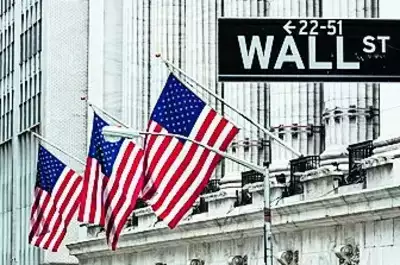US markets close far lower as chances for a rate decrease are dimmed by stubborn inflation
Wednesday saw a sharp decline on Wall Street due to growing worries that the inflationary pressures of late are not just passing trends but rather permanent ones. The bulk of the stocks in the index fell along with the 0.9% loss in the S&P 500. Both the Nasdaq composite and the Dow Jones Industrial Average had declines of 0.8% and 422 points, respectively, during this period.

This negative trend was set off by a report that showed inflation in the most recent month exceeded expectations, which was the third data point in a row to raise the possibility that the trend of declining high inflation may be faltering. The hope that the dismal inflation figures for January and February might be disregarded for technical reasons is called into question by these events.
Chief global economist at Vanguard, Joe Davis, said, “There are still embers of inflation here and there in the economy.” This scenario scares Wall Street with the possibility that the Federal Reserve may postpone the planned interest rate reductions, which might result in even higher costs for consumers.
Since Halloween, the S&P 500 has increased by more than 20% on the anticipation that the Federal Reserve would lower its primary interest rate, which is now at a two-decade high. The Fed has remained cautious, however, as it looks for further proof of a long-term decline in inflation that will push it closer to its 2% objective.
According to Annex Wealth Management’s senior economist, Brian Jacobsen, “three data points may constitute a trend, but two don’t.” The market is now preparing for the prospect that the Fed will change course and contemplate raising interest rates instead of cutting them, particularly if future data continues to show this pattern.
The revelation caused instantaneous changes in the bond market as well; the yield on the 10-year Treasury increased from 4.36% to 4.54%. As a result, traders drastically lowered their wagers on a June rate reduction, with only 17% of traders believing that it would occur, compared to roughly 74% a month earlier.
Real estate stocks in the S&P 500 fell 4.1% on Wednesday, making real estate investment trusts and utilities among the industries most vulnerable to rising interest rates. The S&P 500 dropped 49.27 points, the Dow fell 422.16 points, and the Nasdaq composite dropped 136.28 points as the day came to a conclusion.
Not only did the inflation figures dash prospects of rate reduction, but they also brought attention to US stock prices, which some think seem too high. With Delta Air Lines’ better-than-expected results leading the way in the next earnings season, all eyes are on how corporate profits will fair in the face of these economic headwinds.
The inflation news had a mixed effect on markets throughout the world, with Hong Kong stocks soaring while Shanghai stocks fell after Fitch Ratings’ downgrading of China’s financial outlook. The revelation also caused the dollar to strengthen, which in turn caused the yen to drop to a 33-year low versus it.
The worldwide financial community is on edge as Wall Street struggles with these inflation worries and is intently watching the Federal Reserve’s future steps and their possible effects on the world economy.







